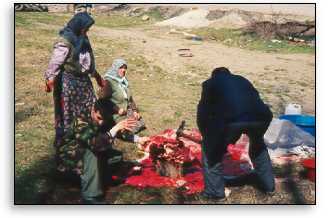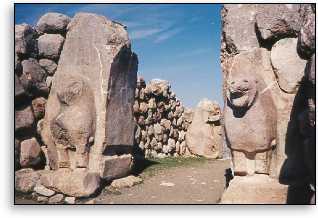Ankara, Hattusas, drive to Cappadocia
Western Turkey - Group Journal
Day 4 -
Tuesday, 7 April 1998
by Dave and Cay Pratt
5:45 a.m.: The Ankara Express is heading across central Anatolian countryside that could as well be eastern Montana - rolling hills, winter wheat fields surrounded by poplar tree windbreaks and the looks of a place right on the edge of having enough water to make a crop.
6:00 a.m.: Passing the town of Gordion - must not be Montana. Here an ox yoke was knotted onto a wagon tongue 3000 years ago, waiting for a hero to come along and cut the knot. (Three Americans questioned as to the identity of that hero said: Jason [wrong]; Hercules [wrong]; Alexander [right -someone was listening to Meli's lecture]).
6:35 a.m. : Sunrise over Anatolia.
7:45 a.m. : Train pulls into Ankara very nearly on time.
Two related items:
(1) 60,000,000 sheep will be sacrificed today in Turkey. It's Kurban Bayrami, the commemoration of God's allowing Abraham to sacrifice a ram rather than son Isaac. (Ed. Note: This impossible number came from Meli. The Turkish Daily News used a much more believable 2,500,000.)
(2) The best museum in Ankara and Turkey, in fact one of the best in the world, the Museum of Anatolian Civilization, is closed for the holiday.
Seen on the Ankara RR station parking lot:
(1) The Hittite "Strange Creature" statue with the Turkish sage/clown Nasreddin Hodjo seated at its front end facing backwards toward his followers:
(2) A Mercedes bus with the Turkish guide Mehlika Seval at its front end facing backwards toward her followers.
Drive through Ankara, past the massive government buildings of the present bureaucracy and past the small old legislative building where Turkey's present began, with the 1923 Declaration of independence.
Ankara population:
1920 - 10,000
1998 - 3,500,000

On to the Ataturk Mausoleum for an emotional tribute to Turkey's 20th century hero, Mustafa Kemal (Ataturk) who brought about a huge revolution in Turkey between 1915 and 1938;
- Driving Britain, Greece, Italy, and France from Turkish territory, to consolidate the present boundaries;
- Bringing about a secular state under a democratic form of government by removing first the political power and then the religious leadership from the sultan, and replacing religious courts with civil courts;
- Emancipating women
- Introducing the Latin alphabet and phonetically adapting the Turkish language to it;
- Eliminating many Arabic and Persian words and replacing them with words with Turkish roots;
- "Outlawing" wearing of the fez and veil;
- Introducing the metric system
- Replacing the lunar calendar with the Gregorian calendar.
On the steps in front of Ataturk's tomb were his words, "Sovereignty belongs to the people unconditionally." Meli summarized an important struggle in 1990's Turkey by contrasting these words with the view of the Muslim fundamentalist, "Sovereignty belongs to God unconditionally."
Ed Note: In an emotional tribute to Ataturk, Meli read a portion of one of his speeches:
"Those heroes that shed their blood and lost their lives are now lying in the soil of a friendly country. Therefore rest in peace. There is no difference between the Johnnies and Mehmets to us where they lie side by side here in this country of ours. You the mothers who sent their sons from far away countries wipe away your tears. Your sons are now in our bosom and are at peace."
 Leaving Ankara, the bus passed
families sacrificing animals and stopped at one, where the family welcomed tour
members.
Leaving Ankara, the bus passed
families sacrificing animals and stopped at one, where the family welcomed tour
members.
As our compensation for missing the museum in Ankara, we went
instead to Hattusas, the Hittite capital city of almost 4,000 years ago. Twenty
thousand or so people occupied this spectacular hilltop site.We made two stops
along the city wall, one at a gate with a carved lion at each side, the other
at a long passageway under a massive section of wall.

Note of personal bias by Dave Pratt: Several hours at Hattusas would be a great substitution for shopping in Istanbul at the Covered Bazaar, Spice Market and modern business district.
The long bus ride from Hattusas to Cappadocia gave everyone a chance to give a brief oral history how they got here and what they hope to gain by being here. No surprise: Meli demonstrated her talent in converting information into a great story (perhaps not as brief as some).
Dinner at a restaurant on the Red River in Avanos.
The night at the Green Motel, where ETBD tours have helped a local family to build up their establishment over the years.